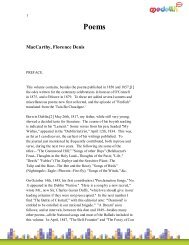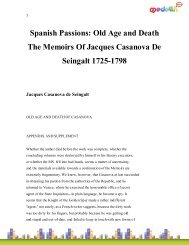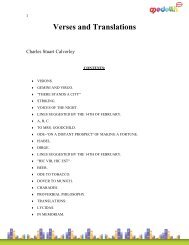Lectures On The English Poets William Hazlitt
Lectures On The English Poets William Hazlitt
Lectures On The English Poets William Hazlitt
Create successful ePaper yourself
Turn your PDF publications into a flip-book with our unique Google optimized e-Paper software.
8<br />
forms of imagination, and with the deepest workings of the heart, and<br />
rouses the whole man within us.<br />
<strong>The</strong> pleasure, however, derived from tragic poetry, is not any thing<br />
peculiar to it as poetry, as a fictitious and fanciful thing. It is not<br />
an anomaly of the imagination. It has its source and ground-work in the<br />
common love of strong excitement. As Mr. Burke observes, people flock to<br />
see a tragedy; but if there were a public execution in the next street,<br />
the theatre would very soon be empty. It is not then the difference<br />
between fiction and reality that solves the difficulty. Children are<br />
satisfied with the stories of ghosts and witches in plain prose: nor do<br />
the hawkers of full, true, and particular accounts of murders and<br />
executions about the streets, find it necessary to have them turned into<br />
penny ballads, before they can dispose of these interesting and<br />
authentic documents. <strong>The</strong> grave politician drives a thriving trade of<br />
abuse and calumnies poured out against those whom he makes his enemies<br />
for no other end than that he may live by them. <strong>The</strong> popular preacher<br />
makes less frequent mention of heaven than of hell. Oaths and nicknames<br />
are only a more vulgar sort of poetry or rhetoric. We are as fond of<br />
indulging our violent passions as of reading a description of those of<br />
others. We are as prone to make a torment of our fears, as to luxuriate<br />
in our hopes of good. If it be asked, Why we do so? the best answer will<br />
be, Because we cannot help it. <strong>The</strong> sense of power is as strong a<br />
principle in the mind as the love of pleasure. Objects of terror and<br />
pity exercise the same despotic control over it as those of love or<br />
beauty. It is as natural to hate as to love, to despise as to admire, to<br />
express our hatred or contempt, as our love or admiration.<br />
"Masterless passion sways us to the mood<br />
Of what it likes or loathes."<br />
Not that we like what we loathe; but we like to indulge our hatred<br />
and scorn of it; to dwell upon it, to exasperate our idea of it by every<br />
refinement of ingenuity and extravagance of illustration; to make it a<br />
bugbear to ourselves, to point it out to others in all the splendour of<br />
deformity, to embody it to the senses, to stigmatise it by name, to<br />
grapple with it in thought, in action, to sharpen our intellect, to arm<br />
our will against it, to know the worst we have to contend with, and to<br />
contend with it to the utmost. Poetry is only the highest eloquence of<br />
passion, the most vivid form of expression that can be given to our<br />
conception of any thing, whether pleasurable or painful, mean or

















